|
|
|
Sort Order |
|
|
|
Items / Page
|
|
|
|
|
|
|
| Srl | Item |
| 1 |
ID:
086422
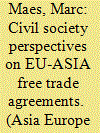

|
|
|
|
|
| Publication |
2009.
|
| Summary/Abstract |
This paper focuses on the positions taken by civil society organisations that actively campaign on trade policies. Trade campaigners oppose the neo-liberal approach to trade and development and advocate a much more gradual and prudent approach to trade liberalisation. They stress that trade liberalisation will only lead to sustainable development if it respects environmental and social concerns, including the gender dimension of trade; if trade liberalisation is properly owned, prepared and sequenced; adapted to the institutional and economic needs and capacities of the countries and people involved, and accompanied by all necessary flanking measures. Trade campaigners stress the need to maintain policy space and the necessary governance instruments to react to changing circumstances and address social and environmental concerns. They denounce the lack of information, consultation and participation provided by governments in trade policy formulation and negotiations and they campaign to raise awareness and create more room for debate and participation.
This article builds on a paper presented on 19-20 June 2008 at an UNU-CRIS Work Shop in Bruges on "Deep Integration and North-South Free Trade Agreements. EU Strategy for a Global Economy".
|
|
|
|
|
|
|
|
|
|
|
|
|
|
|
|
| 2 |
ID:
138690
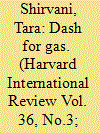

|
|
|
|
|
| Summary/Abstract |
The end of the 19th century, Lord Curzon, then the British Viceroy of India, described Iran and its neighboring Arab countries as “pieces on a chessboard upon which is being played out a game for the domination of the world.” Fast-forward to the 21st century and not much has changed, as the ongoing nuclear negotiations between Iran and the West have started to show implications well beyond the Middle East peacemaking process, even spilling over into the European Union’s strategic decisions on how to consciously uncouple from Russia’s gas supply monopoly. So far, while Iran reached an interim one year deal with the West in early 2013 to freeze all nuclear activities on the condition of being provided with a temporary easing of some sanctions, the pace of progress remains slow. For now, the West is failing to propose an attractive policy that would alter the intransigent stand of the Iranians.
|
|
|
|
|
|
|
|
|
|
|
|
|
|
|
|
| 3 |
ID:
138687
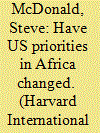

|
|
|
|
|
| Summary/Abstract |
At the end of the first ever US-Africa Leaders Summit on August 7, 2014, President Obama declared that it had been an “extraordinary event,” citing the accomplishments of the summit in terms of trade, investment, and security cooperation. Included in the latter category was a commitment to peacekeeping and the need to address corruption and bad governance in the continent.
|
|
|
|
|
|
|
|
|
|
|
|
|
|
|
|
| 4 |
ID:
138689
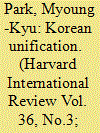

|
|
|
|
|
| Summary/Abstract |
n January 2014, South Korean President Park Geun-hye’s reference to the unification of the two Koreas as a potential “economic bonanza” caused a resurgence of interest in the unification dialogue. Subsequently, in May and June of 2014, President Park brought up the topic of unification as a major agenda item for South Korea, toward which both US President Obama and Chinese President Xi Jingping expressed approval. The North Korean regime, however, evinced a strong negative reaction to these statements, and the official newspaper of the Central Committee of the Worker’s Party of Korea, Rodong Sinmun, made its stance explicit in arguing that the international community’s confrontational maneuvers “injure [the North Korean] ideology and system.” Countries neighboring the Korean peninsula have also tended to accept unification as an elusive vision for the future rather than as an immediate possibility. To what extent, then, are the theories of peaceful unification feasible initiatives, and how can they contribute to peacebuilding in northeast Asia and the international community?
|
|
|
|
|
|
|
|
|
|
|
|
|
|
|
|
| 5 |
ID:
086643


|
|
|
|
|
| Publication |
2009.
|
| Summary/Abstract |
In 1997, Princeton University Press published a volume, What's Happened to the Humanities?, which rang with alarm.Even contributors such as Francis Oakley, Carla Hesse, and Lynn Hunt, who tried to warn against despair by explaining how the current situation had come about,provided only a fragile defense against fundamental and deeply threatening change,while others such as Denis donoghue and Gertrude Himmelfarb wrote in palpable fear of the future.
|
|
|
|
|
|
|
|
|
|
|
|
|
|
|
|
| 6 |
ID:
085158


|
|
|
|
|
| Publication |
DelhI, B R Publishing Corporation, 19888.
|
| Description |
286 p.
|
| Standard Number |
8170184673
|
|
|
|
|
|
|
|
|
|
|
|
Copies: C:1/I:0,R:0,Q:0
Circulation
| Accession# | Call# | Current Location | Status | Policy | Location |
| 028918 | 320.954/SEN 028918 | Main | On Shelf | General | |
|
|
|
|
| 7 |
ID:
180079
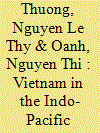

|
|
|
|
|
| Summary/Abstract |
The Indo-Pacific region is an area adjacent to some oceans and the gateway that connects the great power and small countries to the world; this region is always considered by Vietnam as a key strategic geographic area, having direct impact on national security, position and its role in this region. While big powers have different perceptions of the Indo-Pacific region, as a country occupying an important geographic position in the Pacific region, Vietnam shares a common vision of an open and rule-based area, and a common interest in maintaining peace, stability and prosperity as well as building a common space for coexistence and development with the belief that the Indo-Asian-Pacific is large enough for every nation to grow and prosper. This article finds out that recent changes in the Indo-Pacific region in geopolitics, economics, security and national defence have made many countries, including Vietnam, redefine their global and regional policies to refresh their strategic perceptions. Vietnam has its own perception, position, approach and national orientations, which is shaping its state behaviour and perspectives in this geopolitically vibrant Indo-Pacific region. Besides, this article uses the SWOT analysis model to determine the challenges, strengths and weaknesses of Vietnam in the Indo-Pacific region. Moreover, while the future of the Indo-Pacific in a post-COVID-19 pandemic world remains filled with uncertainty and economic challenges, the crisis also presents an opportunity for Vietnam to re-evaluate its position. Today, Vietnam always maintains its foreign policy of independence, self-reliance, multilateralism and diversification of international relations, which attaches great importance to enhancing multi-faceted cooperation with countries in the Indo-Pacific region. Thus, with its own perception and geostrategic advantage, Vietnam—a developing country in the region and in the world with relatively stable economic growth, pursuing rules and order will be a positive factor for a stable, peaceful and prosperous development in the region.
|
|
|
|
|
|
|
|
|
|
|
|
|
|
|
|
|
|
|
|
|